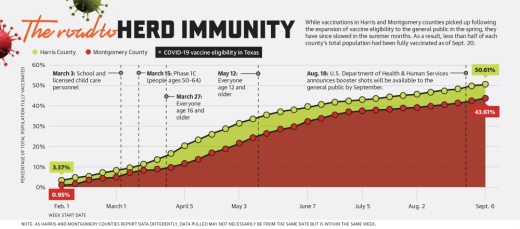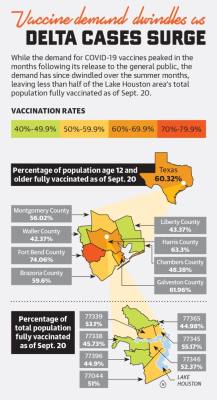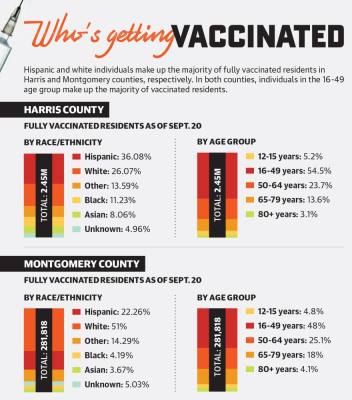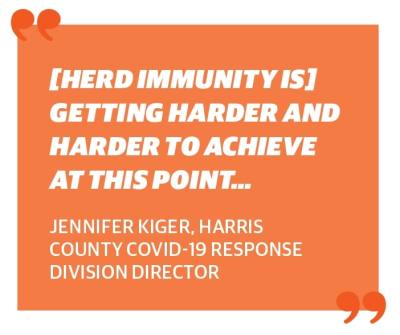“I do believe [COVID-19] is different,” Barnum said. “This year, for the first time in 20 years, I got the Pfizer vaccine in March and April.”
Barnum is one of more than 159,200 Lake Houston-area residents who had been fully vaccinated as of Sept. 20, according to data from the Texas Department of State Health Services—just under half of the seven-ZIP code area’s total population.
Jennifer Kiger, who was recently named director of Harris County’s new COVID-19 response division, said the Lake Houston area is among the areas with the lowest vaccination rates countywide.
The new 69-position division was created by Harris County commissioners Aug. 24 and will be taking over COVID-19 testing, vaccination and outreach countywide for the next two years. The $17 million division is being funded through the Public Improvement Contingency Fund and federal COVID-19 relief grants.
“When we look at vaccination rates across the county, ... we do see lower vaccination rates in the north, central and east parts of the county,” Kiger said. “But in general, we’re not at the point where we need to be across most [Harris County] ZIP codes.”
While Harris County Public Health rolled out a variety of initiatives this summer to incentivize vaccines, Kiger said reaching herd immunity—when a sufficient proportion of a population is immune to an infectious disease—is becoming increasingly unattainable.
“[Herd immunity is] getting harder and harder to achieve at this point because of the variants and low vaccination rates,” Kiger said. “What we’re trying to achieve now is ... a lower hospitalization rate, low morbidity/mortality rates and ... getting out of our current threat level and ... less community spread.”
Summer slowdown
Since Texas expanded COVID-19 vaccine eligibility in mid-May to include everyone age 12 and older, HCPH has been making vaccines more accessible to its more than 4.7 million residents by establishing mass vaccination sites, mobile vaccination sites through community partnerships and a COVID-19 vaccine hotline.
“As we’ve seen more providers come online, we were able to kind of shift our focus to ... ‘vaccine deserts’ where we didn’t have a lot of accessibility to vaccines,” Kiger said.
Similarly, the Montgomery County Public Health Department and the Montgomery County Hospital District have administered more than 150,000 vaccine doses during drive-thru events countywide, according to MCHD Public Information Officer Misti Willingham.
In addition to hosting public vaccination events, the entities have traveled to nursing homes, community centers, at-risk communities and individual homes to administer vaccines.
“Now that vaccines are widely available, we continue our push to answer residents’ questions and provide medical direction, but ultimately, one’s health care is a personal decision,” Willingham said.
However, as the delta variant began spreading throughout the Greater Houston area over the summer, the demand for vaccinations simultaneously dropped across both counties.
As a result, Harris County raised its coronavirus threat level back to red Aug. 5, signifying a severe and uncontrolled level of the virus in the community. At the time, Harris County had over 20,000 actives cases of COVID-19 and a testing positivity rate of over 15%.
Similarly, Montgomery County commissioners approved a 30-day disaster declaration Aug. 10 following the county’s Aug. 9 COVID-19 update, in which officials reported 170 out of 174 intensive care unit beds were in use and COVID-19 patients made up 16.2% of area hospital capacity.
While the U.S. Food and Drug Administration issued formal approval of Pfizer’s vaccine Aug. 23, Kiger said the change in demand for vaccines has been minuscule.
Incentivizing vaccines
In hopes of driving up vaccination rates, HCPH launched a pair of incentive programs this summer.
In May, county officials launched a 10-week scholarship program, during which a $5,000 scholarship was awarded each week to a student who received a vaccine from a HCPH site. Kiger said HCPH has vaccinated more than 25,000 residents under age 18, which she said can be partially attributed to the scholarship program.
In the same spirit, HCPH launched a second incentive program Aug. 17, in which anyone who received a vaccine at a HCPH site through Aug. 31 would receive $100. Citing a 706% increase in daily vaccinations, county officials later expanded the program to include all medical providers countywide. The program was further extended to run through Sept. 14.
In Montgomery County, however, Willingham said the MCPHD has not received American Rescue Plan Act funds, which can be used to pay for incentives for vaccinations, as these funds were allocated directly to Montgomery County. The county received $57 million in 2021 and expects another $57 million in 2022.
“The U.S. Department of Treasury is encouraging local governments to use these funds to enhance vaccination efforts, including providing individual vaccine incentives,” Willingham said.
While using ARPA funds to incentivize vaccines was proposed, Montgomery County commissioners opted Aug. 10 to allocate $150,000 to be used for medical supplies and personal protective equipment, $9 million to bring additional hospital staff to the county to meet current demand and $6 million to be used for mental health services.
Looking ahead
With Pfizer’s third dose—a vaccine booster shot available to some patients eight months after full vaccination—coming down the pipeline, county officials are gearing up for another spike in demand this fall.
While the third dose is only available for those age 16 and older who are immunocompromised, Kiger said she expects eligibility to be expanded in the coming weeks. In preparation, the HCPH COVID-19 Division is ramping up its efforts as many fully vaccinated residents will soon hit their eight-month booster shot milestone.
“We’re able to see within our database which patients who got their first and second dose from us will be due for their dose, and so we’re planning appropriately for that,” Kiger said.
While Willingham said Montgomery County is awaiting guidance from the state on booster shot distribution, the MCPHD and the MCHD will be ready to help administer booster shots if and when the time comes.
“There is still so much that isn’t known about this virus,” Willingham said. “What we know for sure is vaccinations are highly effective at preventing hospitalization and death. The vast majority of people who are hospitalized or die with COVID-19 are unvaccinated.”








